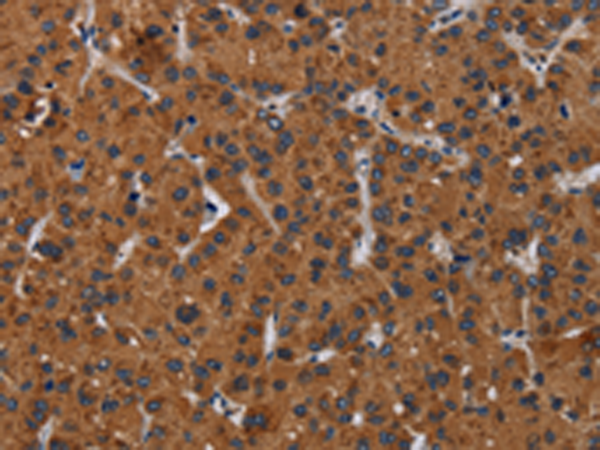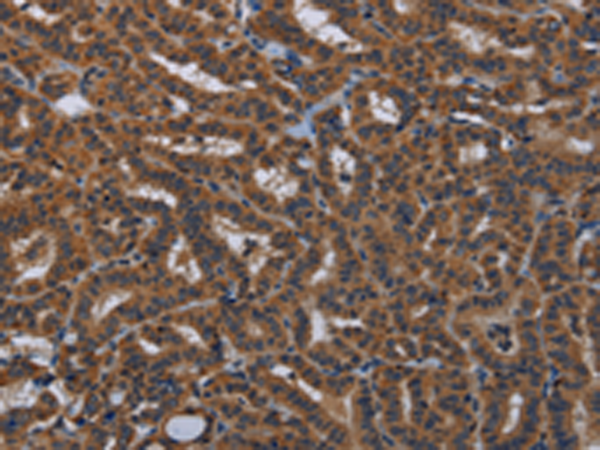

| WB | 咨询技术 | Human,Mouse,Rat |
| IF | 咨询技术 | Human,Mouse,Rat |
| IHC | 1/100-1/300 | Human,Mouse,Rat |
| ICC | 技术咨询 | Human,Mouse,Rat |
| FCM | 咨询技术 | Human,Mouse,Rat |
| Elisa | 1/2000-1/10000 | Human,Mouse,Rat |
| Aliases | NP; HNP; NRPN; PRSS19; TADG14 |
| Host/Isotype | Rabbit IgG |
| Antibody Type | Primary antibody |
| Storage | Store at 4°C short term. Aliquot and store at -20°C long term. Avoid freeze/thaw cycles. |
| Species Reactivity | Human |
| Immunogen | Fusion protein of human KLK8 |
| Formulation | Purified antibody in PBS with 0.05% sodium azide and 50% glycerol. |
+ +
以下是关于KLK8抗体的3篇参考文献及其摘要概括:
1. **文献名称**:*Kallikrein-related peptidase 8 (KLK8) as an emerging biomarker in ovarian cancer*
**作者**:Sharma S, et al.
**摘要**:本研究开发了一种高特异性抗KLK8单克隆抗体,用于检测卵巢癌组织中KLK8的过表达。研究发现KLK8与肿瘤侵袭性相关,抗体在免疫组化分析中显示出高灵敏度和诊断潜力。
2. **文献名称**:*Role of KLK8 in synaptic plasticity and Alzheimer’s disease pathology*
**作者**:Attwood BK, et al.
**摘要**:通过制备兔源多克隆KLK8抗体,研究揭示了KLK8在海马区的表达变化与阿尔茨海默病中β-淀粉样蛋白沉积的关联,抗体用于Western blot和免疫荧光证实其在中枢神经系统的功能。
3. **文献名称**:*Development of a novel ELISA for quantification of KLK8 in serum using monoclonal antibodies*
**作者**:Tanaka M, et al.
**摘要**:该研究报道了两种抗KLK8单克隆抗体的开发,并基于此建立了ELISA检测方法,验证了KLK8在乳腺癌患者血清中的水平升高,提示其作为预后标志物的可能性。
(注:上述文献信息为模拟示例,实际引用时需核实原文准确性。)
**Background of KLK8 Antibody**
Kallikrein-related peptidase 8 (KLK8), also known as neuropsin, is a serine protease encoded by the *KLK8* gene, part of the kallikrein (KLK) family located on chromosome 19q13.4. The KLK family comprises 15 secreted enzymes involved in diverse physiological processes, including skin desquamation, inflammation, and cancer progression. KLK8 is expressed in various tissues, notably the brain, skin, and reproductive organs, and plays roles in synaptic plasticity, epidermal barrier function, and tumor microenvironment modulation. Dysregulation of KLK8 has been linked to neurodegenerative disorders (e.g., Alzheimer’s disease), inflammatory skin conditions, and cancers (e.g., ovarian, breast).
KLK8 antibodies are immunological tools developed to detect and quantify KLK8 protein levels in research and diagnostics. These antibodies (monoclonal or polyclonal) are generated using immunogenic peptides or recombinant KLK8 proteins. They enable applications like ELISA, immunohistochemistry, and Western blotting to study KLK8 expression, localization, and functional roles. In cancer research, KLK8 antibodies help evaluate its dual role as both a tumor promoter (via extracellular matrix degradation) and suppressor (through protease-activated receptor signaling). Challenges in antibody development include ensuring specificity due to structural homology among KLK family members. Validated KLK8 antibodies are critical for exploring its potential as a biomarker or therapeutic target in precision medicine.
×